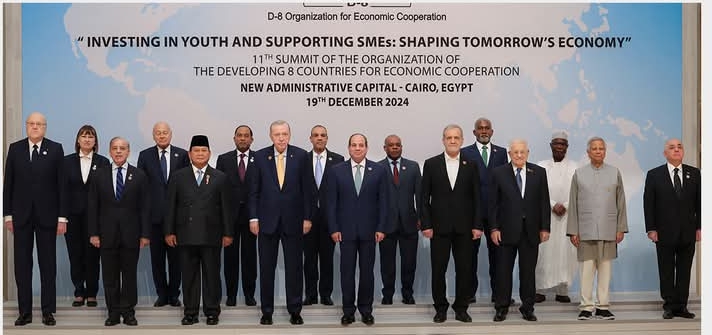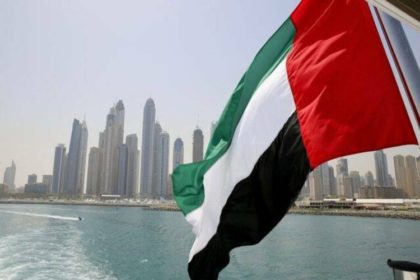By Adeyemi Adekunle
Leaders from Turkey, Iran, Egypt, and other member states of the D-8 Organization for Economic Cooperation convened in Cairo on Thursday for a high-stakes summit, the first major meeting of its kind since the ouster of Syrian President Bashar al-Assad.
The gathering looks at renewed diplomatic efforts to address the region’s escalating challenges, including the Gaza conflict, fragile ceasefire in Lebanon, and ongoing unrest in Syria.
The summit brought together key figures such as Iranian President Masoud Pezeshkian, Turkish President Recep Tayyip Erdogan, and Egyptian President Abdel Fattah El-Sisi, with leaders posing for a symbolic group photograph that highlighted the importance of regional solidarity in these uncertain times.
Turkey and Iran’s attendance marked a significant moment for regional diplomacy.
The two nations historically backed opposing sides in Syria’s civil war—Turkey supporting opposition forces and Iran firmly aligning with Assad’s regime. Their presence at the same summit signaled a potential thaw in their diverging positions, with Syria’s future emerging as a major theme during the discussions.
In his address to the summit, Turkish President Recep Tayyip Erdogan delivered a call for reconciliation in Syria, stressing the need to restore the country’s territorial integrity and promote coexistence among its diverse population.
“The restoration of Syria’s territorial integrity and unity is critical,” Erdogan said, adding that “a Syria free of terrorism, where all religious sects and ethnic groups live side by side in peace, is our shared aspiration.”
Erdogan’s remarks was an appeal for regional powers to bridge their differences and work collaboratively to stabilize Syria, which remains fractured by years of war and foreign intervention.
His speech also underlined Turkey’s broader push to promote regional peace while addressing security threats, particularly from militant groups operating near its borders.
Iranian President Masoud Pezeshkian echoed similar sentiments, albeit with a focus on solidarity among Muslim-majority nations to confront shared challenges.
While Pezeshkian refrained from directly addressing Syria’s political future, his participation underscored Iran’s readiness to engage in regional dialogues, even with countries like Turkey that have traditionally opposed Tehran’s position.
The D-8 summit, which includes Bangladesh, Indonesia, Malaysia, Nigeria, and Pakistan alongside its Middle Eastern members, provided a platform to address not only political tensions but also economic cooperation.
Discussions emphasized the need for stronger economic partnerships to bolster growth across member states, particularly as the region grapples with the fallout of ongoing conflicts.
Against the backdrop of Israel’s war in Gaza, participants also highlighted the humanitarian crisis unfolding in the Palestinian territories, calling for urgent international intervention to secure peace and aid. The fragile ceasefire in Lebanon and concerns about escalating tensions across the region further dominated side discussions among leaders.
Egyptian President Abdel Fattah El-Sisi, hosting the summit, underscored the importance of collective action. “Our region faces challenges that require us to stand together, economically and politically, to secure a better future for our people,” he said.
The gathering did not only symbolized a renewed push for regional diplomacy but also economic cooperation amid deep-seated divisions. Whether this meeting translates into concrete action remains to be seen, but for now, the image of regional leaders standing side by side in Cairo reflects a shared recognition of the need for dialogue and unity in a fractured region.




